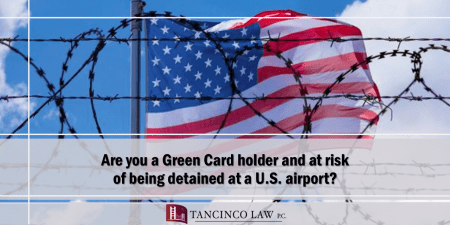
Green card holders returning from international travel have fundamental rights. A valid green card serves as proof that the traveler is authorized to enter the United States as a returning resident. However, if the Customs and Border Protection (CBP) officer has concerns about your immigration history, prior criminal activity, or past violations, you may be referred to secondary inspection for further questioning.
Determining Your Status Upon Re-Entry
If CBP determines that you are a returning resident, you should be processed quickly and allowed to enter the U.S. However, if CBP categorizes you as an arriving alien, you may be found inadmissible and subject to removal proceedings.
You may be classified as an arriving alien if you:
- Abandoned or relinquished your lawful permanent resident (LPR) status
- Were absent from the U.S. for more than 180 consecutive days
- Engaged in illegal activity after departing the U.S.
- Left the U.S. while in removal or extradition proceedings
- Committed certain crimes, unless you were granted a waiver
- Attempted to enter the U.S. without inspection
If you are categorized as an arriving alien, you may be placed in detention, denied entry, or required to appear before an immigration judge.
Your Right to a Hearing Before an Immigration Judge
If CBP deems you an arriving alien and charges you as removable, you have the right to a hearing before an immigration judge. Only an immigration judge—not CBP—can make a final decision regarding your lawful permanent resident status.
If CBP believes you have abandoned your residence but you refuse to sign a Form I-407 (Record of Abandonment of Lawful Permanent Resident Status), CBP must issue you a Notice to Appear (NTA) so you can present your case in immigration court.
What to Expect at Secondary Inspection
Referral to secondary inspection is not an automatic denial of entry. It is an additional screening process where CBP officers will:
- Ask you questions about your travel and background
- Collect biographic and biometric data
- Conduct record checks
- Determine whether you qualify as a returning resident or an arriving alien
This process can take anywhere from a few minutes to several hours, depending on the complexity of your case.
Your Rights During Secondary Inspection:
- Right to Contact Your Consulate: You may request assistance from your home country’s consulate. The consulate can help you communicate with a lawyer or your family.
- Right to Request a Lawyer: Although CBP may inform you that you do not have the right to legal counsel during inspection, you should still ask CBP to document your request for an attorney.
- Right to Review Documents in a Language You Understand: Any documents CBP presents to you should be available in a language you can read and understand.
- Right to Refuse to Sign Documents You Do Not Agree With: You are not required to sign any documents if you disagree with their contents.
Privacy Limitations:
- No Right to Privacy for Electronic Devices: CBP has the authority to inspect your personal belongings, including your phone, laptop, and other digital devices. They may review emails, social media accounts, and other personal data.
- CBP May Retain Your Devices: Your electronic devices may be held temporarily and returned to you at a later time.
Abandonment of Residence – Know Your Rights
CBP may claim that you abandoned your U.S. residence due to prolonged absences from the country and may pressure you to sign Form I-407 (Record of Abandonment of Lawful Permanent Resident Status).
Important Facts About Abandonment:
- Time Spent Abroad Alone Does Not Automatically Lead to Losing Your Green Card. CBP must prove by clear, unequivocal, and convincing evidence that you intended to abandon your U.S. residence.
- Form I-407 Must Be Signed Voluntarily. You are not required to sign it, and there are no negative consequences for refusing to sign.
- If You Sign Form I-407: You still have the right to request a hearing before an immigration judge to contest the abandonment claim.
- If CBP Takes Your Green Card: You have the right to request alternative proof of your lawful permanent resident status, such as a stamp in your passport.
Proactive Steps to Protect Your Status
To avoid delays or legal complications at the airport, consult with an immigration attorney before traveling if:
- You have a criminal record (including arrests, convictions, or pending charges).
- You have a pending application with U.S. Citizenship and Immigration Services (USCIS) or the immigration court (EOIR).
- There are undisclosed issues in your immigration history that could raise concerns during re-entry.
Final Takeaway
As a lawful permanent resident, knowing your rights is crucial when traveling internationally. Not all green card holders face detention upon return, but those classified as arriving aliens may be subject to increased scrutiny and enforcement actions.
Remember: Your green card is your legal proof of U.S. residency, and you should not be pressured into relinquishing it. If questioned, detained, or pressured to sign documents, stand your ground, assert your rights, and seek legal advice.
For more information about your rights and responsibilities as a lawful permanent resident or if you need legal advise contact our attorneys at Tancinco Law, P.C at (415)397 0808 or email us at law@tancinco.com or visit our website at www.tancinco.com




